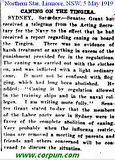Corpun file 24272 at www.corpun.com
Northern Star, Lismore, New South Wales, 5 May 1919, p.5
Caning on the Tingira.
SYDNEY, Saturday. -- Senator Grant has received a telegram from the Acting Secretary for the Navy to the effect that he had received a report regarding caning on board the Tingira. There was no evidence of harsh treatment or anything in excess of the punishment provided for in the regulations. The caning was carried out with the clothes on and was inflicted with a light ordinary cane. It must not be confused with flogging, which had long been abolished. He added: -- "Caning is by regulation allowed in the training ships and in the naval colleges. I am writing more fully." Senator Grant stated today that the members of the Labor party now in Sydney were in favor of the complete abolition of caning. Very probably when the influenza restrictions are removed a meeting of parents and friends and others concerned will be convened to discuss the situation.
Corpun file 24275 at www.corpun.com
The Recorder, Port Pirie, South Australia, 7 May 1919, p.2
Caning in the Navy.
Regulation to be reviewed.
A statement was made on Friday by the Acting Navy Minister with reference to the recent allegations of cruelty connected with the infliction of corporal punishment on a number of trainees attached to the naval training ship Tingara. The Minister said the allegations evidently arose out of an incident that occurred on April 6 at Sydney. On that date, according to a report which he had just received, the boys from the training ship Tingara were landed for their usual recreation at Lyne Park. A party of them, numbering 29 lads, misbehaved themselves ashore, and after removing the palings from a fence, made off in the direction of Bondi. Pickets were sent out after them, but in a few hours the boys voluntarily surrendered themselves at Lyne Park, some at 6.30 p.m. and others at 8.30 p.m.
For their insubordination four of the ringleaders were given twelve strokes of the cane. There were previous convictions for misdemeanor against all these lads, numbering in the ease of one boy, up to as many as thirteen. Of the other delinquents, some were given nine strokes of the cane, and others six strokes, while others were let off with a caution, it being held that they had been led away by the older lads who should have set them a better example. The report showed that none of the boys were caned on the bare skin, as had been alleged, and only a light cane was used.
Mr. Poynton added that according to naval regulations which had been in existence ever since the navy was formed [1901], the use of the cane for certain offences was permissible. But the infliction of corporal punishment on seagoing ships had been abolished four years ago. The cane could only be used on board the training ship Tingira and at the Royal Naval College at Jervis Bay. The regulation set out that caning was limited to boys, and was to be inflicted with a light and ordinary cane, and that the number of cuts or blows was not to exceed twelve. Caning was intended for the serious offences of theft, immorality, drunkenness, bad language, desertion (in special cases as an act of leniency), insubordination, and deliberate or continual disobedience of orders.
The Minister stated that it was his intention to arrange for the Naval Board at its next meeting to review the whole question of corporal punishment, and to decide whether or not it should be entirely abolished.
About this website
Search this site
Country files: Australia
Other external links: Naval corporal punishment
Archive up to 1975: Corporal punishment in Australia
Video clips
Picture index
Previous month


